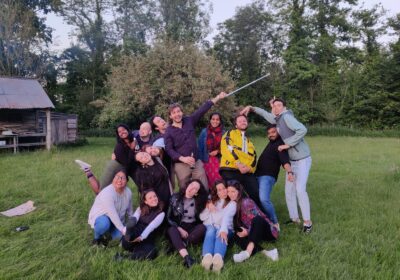Doing your PhD means getting to know a lot of people. Actually, that’s one of the best parts of it. Doing your PhD in an International Training Network means getting to know people with a lot of different backgrounds and ‘homes’. We all have our home locations, home people, home disciplines, home authors, home methods, or home theories.
In such diverse settings, a very natural question during introduction rounds is: “Where are you from?” And that’s an easy one, right? You could say something like: “I’m from Italy” and everybody would know that you grew up in a picturesque village with a mild climate and hot summers, probably near the sea. You’d had delicious food all around you, most likely pizza, pasta, and wines. You probably know how to ride a Vespa and how to communicate effectively using your hands. And you’d know how to play unattractive and defensive, but reasonably successful football. But is this really the case? Or do we impose some stereotypes on you that are neither accurate nor are you particularly proud of them?
For me, answering the question “Where are you from” is quite a difficult one. I was born in (Northern) Germany. I’m definitely “from” there. But I’ve been living in the Netherlands for quite a while now. Indeed, it has become the centre of my life. Some of my closest friends and even part of my core family lives here. I also “feel at home” in such diverse places as Zaragoza, Santa Cruz de la Sierra, Palma de Mallorca, Turin, Utrecht, Berlin, or Nenagh. So, where am I from?
During yet another introduction round, I decided to answer the question by saying “I’m from the European Union”. I felt that this would come as close as I could get. Well, most of the other participants of that round understood it as a joke, intended to lighten things up and also with a slight political touch to it. But I meant it as an honest answer to a quite challenging question, at least for me.
If you cannot even answer the question “Where are you from?”, isn’t that a problem? Am I losing my roots? Should I feel guilty about it? Am I not proud (enough) of where I grew up? No, I just feel equally proud of a lot of different “homes”, some are places, some are people, and some are just mere ideas.

Pixabay, thanks to cocoparisienne
I feel that the simple question of “Where are you from?” sometimes does more harm than good. Some stereotypes that people consciously or unconsciously have in mind after you’ve answered the question might simply not apply to someone. Or the answer might be more complicated for some than for others.
For myself, I decided not to use the question for introductory rounds anymore, although I understand that the different answers can be very interesting for both organizers and participants of such rounds. Still, I think we can come up with equally or even more interesting questions to get to know one another. And I would like to invite you, dear reader, to put some thought into alternatives to the question “Where are you from?”.


 Artificial Intelligence and PhDing/>
Artificial Intelligence and PhDing/> 